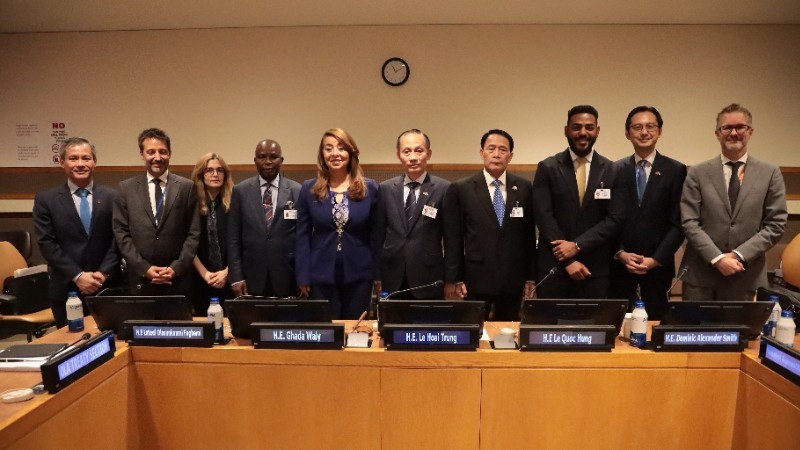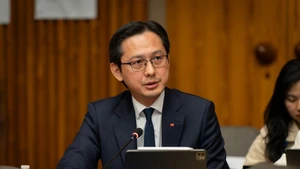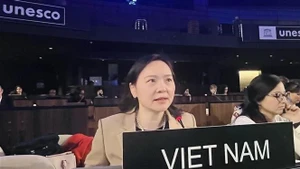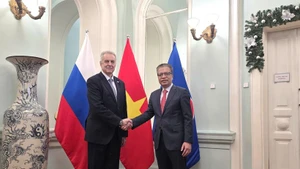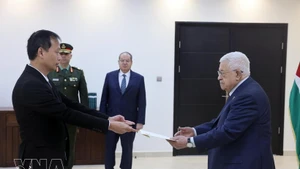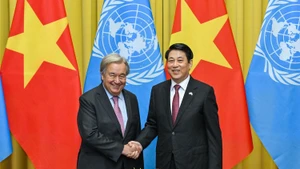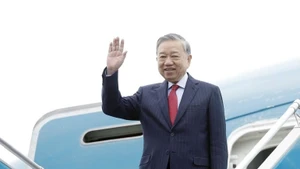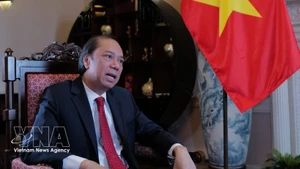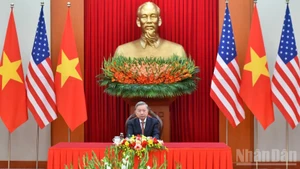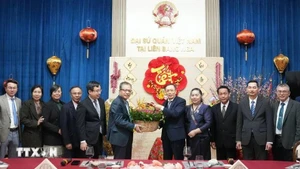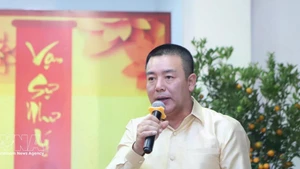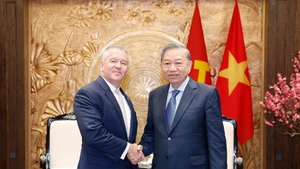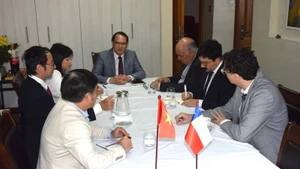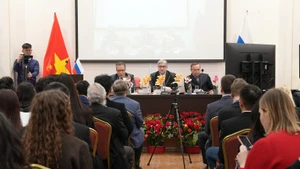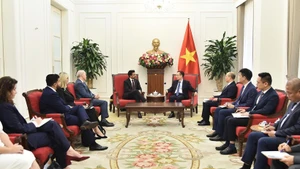The decision by the UN to select Ha Noi as the host city for the Opening Ceremony and High-level Meeting of the UN Convention against Cybercrime — the Ha Noi Convention — under the theme “Combating Cybercrime – Sharing Responsibility – Towards the Future” on October 25–26 reflects global trust in Viet Nam’s capability, responsibility, and position.
This is the first time a global multilateral convention in such a critical field has been associated with a Vietnamese city, underscoring Viet Nam’s international role, position, and reputation in the history of multilateral diplomacy and Viet Nam–UN relations.
For many years, Viet Nam has proactively built and perfected its legal and policy system on cybersecurity, establishing a strong legal foundation for preventing and combating cybercrime. The 2018 Law on Cybersecurity was adopted by the National Assembly.
Article 3 of the 2018 Law on Cybersecurity clearly defines the State's policies on cybersecurity, including: protecting cybersecurity and national sovereignty; building a healthy cyberspace; prioritising resources for specialised forces and cybersecurity technology; encouraging organisations and individuals to participate in protecting and handling cybersecurity risks; and enhancing international cooperation. The law helps concretise relevant legal provisions and is consistent with international standards that Viet Nam has committed to, ensuring the legitimate rights and interests of people, businesses and the state.
On that basis, many subordinate legal documents have been issued, creating a synchronised implementation corridor, such as: Decree No. 04/2019/ND-CP stipulating the order and procedures for implementing cybersecurity protection measures; Decree No. 53/2022/ND-CP detailing the Law on Cybersecurity; and the Prime Minister’s Decision No. 964/QD-TTg on August 10, 2022, approving the “National Cybersecurity and Safety Strategy, proactively responding to challenges from cyberspace until 2025, with a vision to 2030”, which identifies the goal of building Viet Nam into a country capable of proactively preventing, detecting, and effectively responding to all threats in cyberspace.
Amid increasingly complex challenges, Viet Nam has also reviewed and supplemented its criminal law system, litigation, and national security protection with regulations on investigation, prosecution, extradition, and international cooperation in handling high-tech crimes and cross-border cybercrime.
At the third plenary session of the National Assembly’s Committee on National Defence, Security and External Affairs on October 10, 2025, in Ha Noi, the committee proposed adding provisions to the revised Cybersecurity Law prohibiting the use of artificial intelligence (AI) to create, edit or disseminate false or defamatory clips, images, sounds or texts — or to impersonate others — for the purpose of violating legal rights and interests or threatening national security and social order.
Viet Nam has taken the lead in advancing international cooperation on cybersecurity with the UN, INTERPOL, ASEANAPOL, UNODC, and other regional organisations. As a result, many complex cases have been uncovered and timely prevented. Viet Nam is one of the few countries in Asia maintaining a 24/7 coordination mechanism with INTERPOL to share cybercrime-related information. The country has also hosted international conferences and forums to exchange experiences and share solutions to prevent and combat high-tech crimes.
Events such as “Viet Nam Information Security Day” or “National Digital Transformation Week” have become platforms for agencies, experts, enterpises, and international partners to exchange ideas. Many of Viet Nam's initiatives, such as the programmes “Safe Cyberspace for Everyone”, “Improving the Capacity to Identify Fake News”, or “Multi-layered National Cyber Defense System”, are highly appreciated by international organisations for their practicality and replicability.
The UN’s decision to hold the Opening Ceremony for the signing of the UN Convention against Cybercrime in Ha Noi carries profound political and diplomatic significance. On this occasion, President Luong Cuong sent a message to leaders of countries and international friends, emphasised that: “I firmly believe that, with the participation and commitment of countries, the Opening Ceremony for the Signing of the Convention in Ha Noi will become a historic milestone, reaffirming the value of multilateralism with the UN at its core, and sending a powerful message of our determination to combat cybercrime and build a world of peace, justice, and respect for the rule of law, for the benefit of present and future generations.”
I firmly believe that, with the participation and commitment of countries, the Opening Ceremony for the Signing of the Convention in Ha Noi will become a historic milestone, reaffirming the value of multilateralism with the UN at its core, and sending a powerful message of our determination to combat cybercrime and build a world of peace, justice, and respect for the rule of law, for the benefit of present and future generations
Despite the efforts and achievements that Viet Nam has made, hostile forces have taken advantage of the Opening Ceremony for the Signing of the Convention in Ha Noi, which has attracted international attention, to intensify their sabotage activities. On social networking platforms, they have posted and spread false information that Viet Nam "lacks transparency" in handling cybercrime, distorting the provisions of the law on personal data protection, claiming that it is a tool to "control information", "restrict freedom", "violate human rights".
At the same time, they have exaggerated certain cases of law enforcement related to social network misuse, creating prejudice that Viet Nam “violates civil liberties” under the guise of cybersecurity. They have called on the international community not to cooperate with Viet Nam, fabricating claims that Viet Nam’s participation in the Convention is “merely symbolic”.
These arguments are not only false in nature but also aim to achieve political goals, undermining Viet Nam’s prestige, sabotaging our international cooperation efforts to combat cybercrime, and sowing division and doubt among the public. In fact, Viet Nam always adheres to the UN’s principles of respect for sovereignty, ensuring human rights, and promoting equal cooperation.
During the process of building the Law on Cybersecurity, Viet Nam has accepted many recommendations from international organisations, while committing to transparency in implementation, balancing security and privacy rights. Achievements in preventing online fraud, malware attacks, and protecting people's and businesses' data are the clearest evidence of Viet Nam's efforts that have brought practical results, not "control tools" as some distorted arguments claim.
"After many years of tireless efforts, Viet Nam has made remarkable progress and is gradually completing the cybersecurity goals set by the Government in 2025, including monitoring and ensuring information security in cyberspace. Viet Nam's efforts have also been recognised by the International Telecommunication Union (ITU) through the Global Cybersecurity Index 2024 with an impressive score of 99.74. In addition, Viet Nam has continuously maintained cooperative relations in both the public and private sectors to enhance domestic cybersecurity capacity," said Yeo Siang Tiong, General Director of Kaspersky in Southeast Asia.
In response to distortions and sabotage by hostile forces, the press, media, experts, and scholars must take an active role in providing accurate information with a scientific and legal basis, to strengthen the trust of domestic and international public opinion. Authorities should promptly and transparently publicise the results of international cooperation and typical successfully investigated, prosecuted, and tried cases, thereby affirming that the achievements in cybercrime prevention and control result from a long-term, steadfast, strategic, and visionary process.
To continue promoting the role and prestige of the country, it is necessary to promote digital diplomacy, including in international forums and global media, to affirm a proactive, humane Viet Nam, ready to share and cooperate. Along with that, it is necessary to increase investment in specialised forces, improve investigation capacity, professional skills, monitoring technology, and incident response; and expand public-private cooperation in the field of cybersecurity. Each agency, enterprise, organisation, and individual needs to identify cybersecurity as a shared responsibility, constantly raise awareness, take decisive action, and form a “shield” for themselves and for the country in the new development stage.
